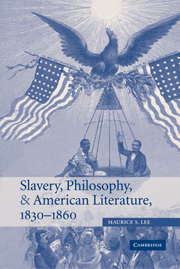Book contents
- Frontmatter
- Contents
- Acknowledgments
- Introduction
- 1 Absolute Poe
- 2 “Lord, it's so hard to be good”: affect and agency in Stowe
- 3 Taking care of the philosophy: Douglass's commonsense
- 4 Melville and the state of war
- 5 Toward a transcendental politics: Emerson's second thoughts
- Epilogue: An unfinished and not unhappy ending
- Index
3 - Taking care of the philosophy: Douglass's commonsense
Published online by Cambridge University Press: 22 September 2009
- Frontmatter
- Contents
- Acknowledgments
- Introduction
- 1 Absolute Poe
- 2 “Lord, it's so hard to be good”: affect and agency in Stowe
- 3 Taking care of the philosophy: Douglass's commonsense
- 4 Melville and the state of war
- 5 Toward a transcendental politics: Emerson's second thoughts
- Epilogue: An unfinished and not unhappy ending
- Index
Summary
Thus far we have seen how Poe and Stowe enter into philosophical narratives: Poe helps to signal the rise of transcendentalism, while Stowe explores the theory of moral sentiments and its tense relation to Calvinism. Romantic, sentimental, and Puritan legacies are certainly important to antebellum literature. Yet the dominant philosophy in pre-Civil War America was Scottish commonsense, represented here by a literary figure not generally regarded in terms of philosophy. Looking back on leaders such as Alexander Crummell, Henry Highland Garnett, Sojourner Truth and “above all, Frederick Douglass,” W. E. B. Du Bois wondered, “Where were these black abolitionists trained?” Du Bois simply called Douglass “self-trained” and said little else on the matter, though subsequent scholarship more stubbornly traces Douglass's intellectual roots. For a time, Douglass's thinking appeared to be fairly representative of his era and not particularly profound, in part because of what David Blight sees as Douglass's strain of realism. Douglass was indeed a politically savvy and remarkably effective abolitionist who first knew slavery as a physical atrocity, not a philosophical problem. Douglass's race and experience as a slave distinguish him from other main figures in this book, and yet as he pursued practical ends he, too, found both disillusionment and hope in the possibilities of philosophy.
As Henry Louis Gates, Jr. first pointed out, the issue is not whether Douglass deals with metaphysics, but rather how he views and deploys its emancipatory power. What Gates calls Douglass's “burden” of knowledge entails important questions.
- Type
- Chapter
- Information
- Slavery, Philosophy, and American Literature, 1830–1860 , pp. 93 - 132Publisher: Cambridge University PressPrint publication year: 2005

